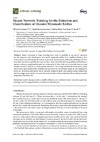Identificador persistente para citar o vincular este elemento:
https://accedacris.ulpgc.es/jspui/handle/10553/74383
| Título: | Neural network training for the detection and classification of oceanic mesoscale eddies | Autores/as: | Santana, Oliverio J. Hernández-Sosa, Daniel Martz, Jeffrey Smith, Ryan N. |
Clasificación UNESCO: | 120304 Inteligencia artificial 120326 Simulación |
Palabras clave: | Classification Convolutional neural network Data analysis Deep learning Detection, et al. |
Fecha de publicación: | 2020 | Publicación seriada: | Remote Sensing | Resumen: | Recent advances in deep learning have made it possible to use neural networks for the detection and classification of oceanic mesoscale eddies from satellite altimetry data. Various neural network models have been proposed in recent years to address this challenge, but they have been trained using different types of input data and evaluated using different performance metrics, making a comparison between them impossible. In this article, we examine the most common dataset and metric choices, by analyzing the reasons for the divergences between them and pointing out the most appropriate choice to obtain a fair evaluation in this scenario. Based on this comparative study, we have developed several neural network models to detect and classify oceanic eddies from satellite images, showing that our most advanced models perform better than the models previously proposed in the literature. | URI: | https://accedacris.ulpgc.es/handle/10553/74383 | DOI: | 10.3390/RS12162625 | Fuente: | Remote Sensing [EISSN 2072-4292], v. 12 (16), 2625, (Agosto 2020) |
| Colección: | Artículos |
Citas SCOPUSTM
27
actualizado el 08-jun-2025
Citas de WEB OF SCIENCETM
Citations
23
actualizado el 01-feb-2026
Visitas
326
actualizado el 15-ene-2026
Descargas
212
actualizado el 15-ene-2026
Google ScholarTM
Verifica
Altmetric
Comparte
Exporta metadatos
Los elementos en ULPGC accedaCRIS están protegidos por derechos de autor con todos los derechos reservados, a menos que se indique lo contrario.
